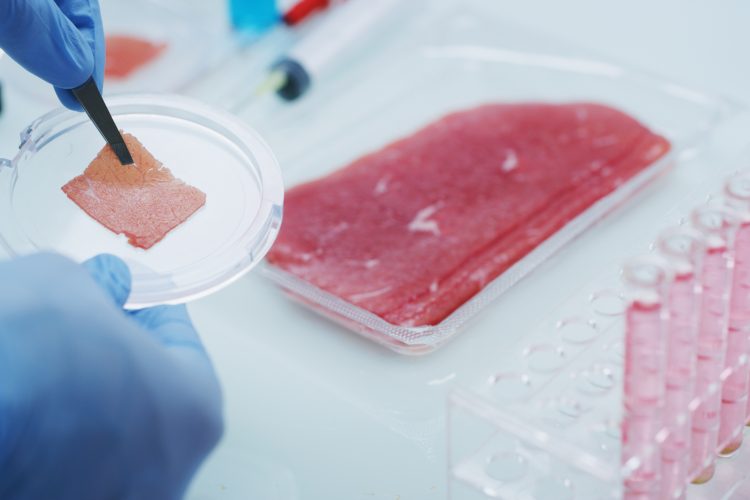Lab-grown meat’s commercial future
- Like
- Digg
- Del
- Tumblr
- VKontakte
- Buffer
- Love This
- Odnoklassniki
- Meneame
- Blogger
- Amazon
- Yahoo Mail
- Gmail
- AOL
- Newsvine
- HackerNews
- Evernote
- MySpace
- Mail.ru
- Viadeo
- Line
- Comments
- Yummly
- SMS
- Viber
- Telegram
- Subscribe
- Skype
- Facebook Messenger
- Kakao
- LiveJournal
- Yammer
- Edgar
- Fintel
- Mix
- Instapaper
- Copy Link
Posted: 19 November 2021 | New Food | No comments yet
New Food interviews the CEO of Matrix Meats to find out why Singapore is so ahead in the lab-grown meat game and how long it will take others to catch up…


Last year, Singapore made headlines as it became the first country in the world to commercially approve lab-grown meat.
The company behind the approved cultured chicken, Eat Just, says it demonstrated the safety of its manufacturing process by running more than 20 production runs in 1,200-liter bioreactors. The company added that no antibiotics are used in this proprietary process and safety and quality validations demonstrated that harvested cultured chicken met the standards of poultry meat, with extremely low and significantly cleaner microbiological content than conventional chicken.
We sat down with another US-based company, Matrix Meats, a food-tech company that specialises in designing and manufacturing scaffolds for cell-based meat in an interview with its CEO to find out more. Here, Eric Jenkusky gives us his views: why he believes Singapore is so ahead and what exactly is preventing authorities in the US from giving the green light.
Q: What are the current limitations of lab grown meat?
A: The three key areas for improvement for cultivated meat production are product characteristics, production costs and regulation.
First, cultivated meat should ideally have the taste and texture of slaughtered meat. The industry is still perfecting the right texture, tenderness, marbling amount and distribution, among other characteristics.
Second, although price is a current barrier to market uptake of cultured meat, the Good Food Institute (GFI) estimates that cultured meat will reach price parity with slaughtered meat once industrial production is achieved at scale. Matrix Meats is a key player in driving down price through our scaffoldings which allows cultured meat companies to scale their production and potentially reduce some of their highest inputs costs, such as cell growth media.
Thirdly, cultured meat is currently not regulated in the US. Industry leaders estimate approximately 12-18 more months for full FDA approval. The US government has made significant investments in the development of cultured meat products through National Science Foundation grant funding, and currently cultured meat approval is in an initial public comment period under the FDA/USDA.
Q: Why is the Singapore market is so far ahead?
A: The Singapore Food Agency (SFA) approved the commercial sale of cultured chicken in December 2020. This regulatory advancement launched the cultivated meat market in Singapore, driving the development and push for approval of other cultivated meats in demand, such as fish and beef. Currently, regulatory processes will delay the public commercialisation of cultivated meats in the US for anywhere between 12-18 months minimum, as mentioned above.
Q: Who will be next to launch lab grown meats to consumers?
A: Although which company will launch the next cultivated meat is unknown, we are seeing progress across cultivated fish, crustaceans, chicken, pork, beef – and even cultivated human breast milk. Regardless of the next product to hit the market, Matrix hopes to be behind these innovative companies to cost-effectively scale their production with our nanofiber microcarriers and scaffoldings.
Q: What work Matrix Meats is undertaking to help turn this dream into reality?
A: Matrix Meats develops nanofiber microcarriers and scaffoldings that enable cultured meat companies to scale their production in a more sustainable way, as all our products are non-animal derived, edible and manufactured for mass cultured meat production. Matrix Meats is a key market player to reduce the costs of production; reach price parity with all types of slaughtered meat; and lastly, ensure that cultivated meat has the desired characteristics that are found in slaughtered meat. We are also driving the sustainability of the cultured meat sector, as our technology could eventually eliminate the need for animal-derived inputs in cultured meat production.
Biography
Eric Jenkusky is the CEO of Matrix Meats. Matrix Meats, based in Columbus, Ohio, is a designer and manufacturer of nano-fiber scaffolds to enable the production of clean, healthy, and environmentally friendly cultured meat to ethically feed the world.









